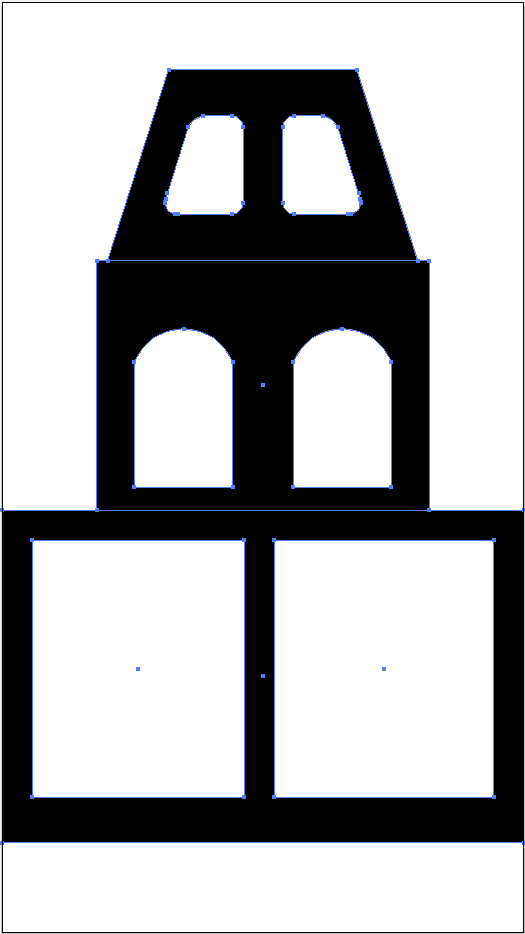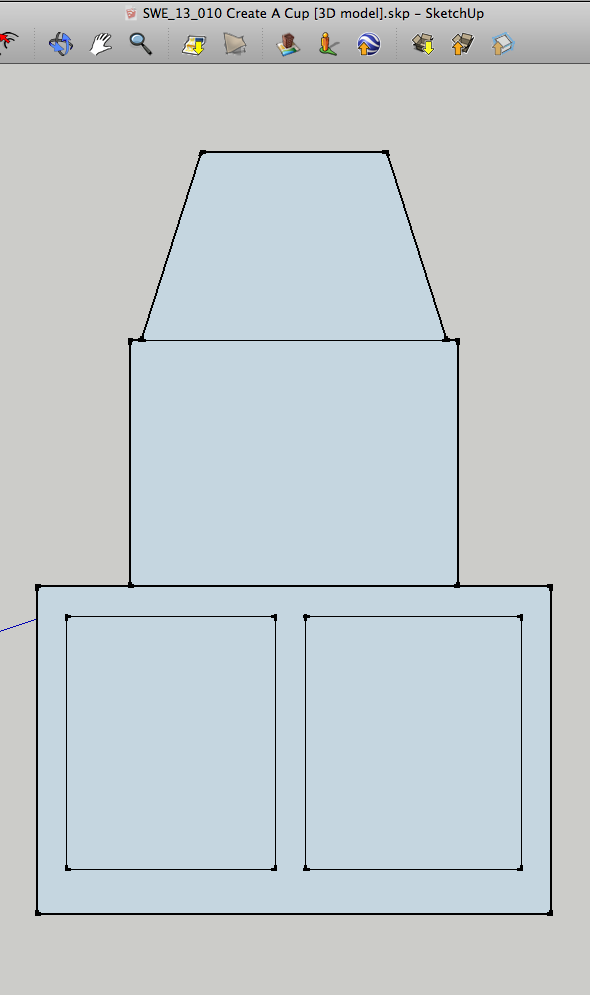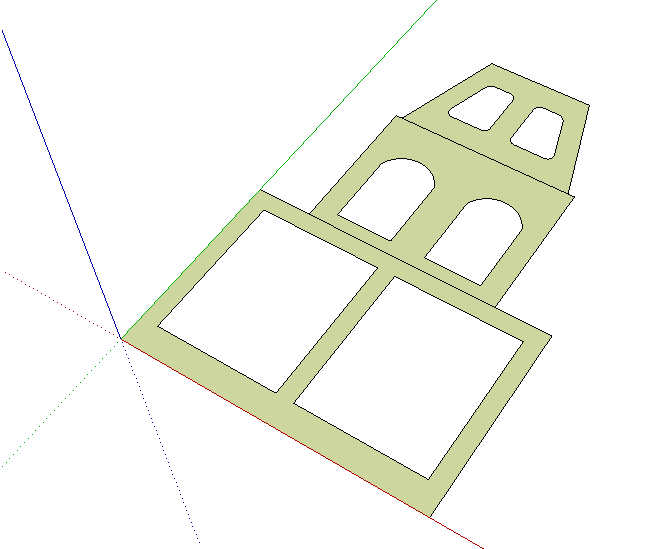[Plugin] Dxf_In v2.2 20110517 Dxf2Skp
-
I'm on PC.
I've just [re]tried Alba.dxf.
Used 'centimeters' as the units - did you ?
It works; but did take a while to complete ['whiting-out' in the process... BUT still processing away nevertheless] AND also it does appear ~66.6m from the origin [but's that's where it is stupidly located in the DXF!].
Comparing the result from the equivalent Pro DXF import... it is missing a few of small lines around a lip and it takes 100x longer! BUT it works and the result is readily usable/fixupable... -
yes, I tried various options (including centimeter). And it run for quite a while, but with all tries it finally aborted.
I have SketchUp 8.0.11751 for Mac (Intel).Rolf
-
Strange - as I say the PC version is slow but works eventually...
Are there any MAC users out there who have this working OK ? -
is there a kind of a debug mode?
To see when, what, why? -
Running it with the Ruby Console open is the best there is - there's not coded-in debugging that I can see...
-
@freewilly said:
I installed the plugin on my Mac.
I see it in the file menu, and can start an import.
But after a certain time it aborts an I get an error window "<error> or empty File".
I have tried different DXF-Files.What do I do wrong?
Rolf
I'm having the same problem. No matter what I do to prepare the file in illustrator, the import dxf dialog in sketchup gives me that error window and quits the import.
-
This may be too late for you but I had used earlier versions of this on an iMac and found that there were sometimes problems which seem to relate to how the file is saved, some operating systems use carriage return -linefeed to denote the end of a line others just used one. I made a mod which allowed it to work on the iMac (see my post of Thu Feb 17, 2011 12:29 am), it may be worth trying it on the new version
I edited the files using Textedit on the mac, just be careful that it doesn't add a .txt extensionTo help I have listed the suggested change below
Find the following bit of code in the.rb file
#get all block names, save them along with their location begin aFile=File.open(chosen_file, "r") rescue result=UI.messagebox "<Error> The DriveName\\Path\\FileName.dxf may not\nbe standard ASCII characters. If so, place the Dxf file\nin a ASCII named folder before accessing that file.", MB_OK end aFile.each_line do |line| count=count +1 if count==odd_number #strip dxf tags thanks to TIG odd_number=odd_number + 2 line=line.strip end last_line=this_line #save last line data this_line=lineand insert the line
line=line.chomp+"\n"
after
aFile.each_line do |line|
it should ensure that all the data read in is terminated in a way that ruby scripts accept, and it shouldn't affect the way they run under windows either. -
Thank you!!!
-
@shrubman said:
@freewilly said:
I installed the plugin on my Mac.
I see it in the file menu, and can start an import.
But after a certain time it aborts an I get an error window "<error> or empty File".
I have tried different DXF-Files.What do I do wrong?
Rolf
I'm having the same problem. No matter what I do to prepare the file in illustrator, the import dxf dialog in sketchup gives me that error window and quits the import.
Same here: "<Error> or Empty File"
Mac OS X 10.6.8
Sketchup 8.0.16845 -
Did you read the next post? Maybe it will help since it seems to answer the question.
The best option would be to use the Pro version of SketchUp.

-
OK, so I added the line=line.chomp+"\n" as described. What does the error message "Database contains Unsupported Entitys: SPLINE" mean? After receiving the message the file continued to import properly.
-
Upon further inspection my file did not import correctly. It seams to be having trouble with the curves. I've attached the DXF file, a screenshot of the original artwork in Illustrator CS4

and a screenshot of the resulting import into Sketchup 8.

-
Works flawlessly with SketchUp's native DXF installer.

-
@anewbeat said:
OK, so I added the line=line.chomp+"\n" as described. What does the error message "Database contains Unsupported Entitys: SPLINE" mean? After receiving the message the file continued to import properly.
That means SPLINES are not supported in the plugin, and the arcs in your .dxf are made using splines.
You could covert the file to an older .dxf version using the Teigha converter, and try importing the converted file. Use dxf version R13 or earlier. There will be more cleanup required, but it should convert the splines to a supported entity.

ODA File Converter
ODA File Converter. ODA builds SDKs for people who work with complex engineering data
Open Design Alliance (www.opendesign.com)
-
@jim said:
Use dxf version R13 or earlier. There will be more cleanup required, but it should convert the splines to a supported entity.
When I export from Illustrator as R13 I get this error message: "*Block U1 contains a unsupported mesh". These are extremely simple paths made up of simple arcs and line segments. Why don't the arcs remain arcs after export?
-
Sounds like a question for the Illustrator people. Do they have a support forum?
-
@dave r said:
Sounds like a question for the Illustrator people. Do they have a support forum?
The error is from the Dxf_in plugin.
Try FreeDXF: http://sketchucation.com/forums/viewtopic.php?t=22199
FreeDXF does a somewhat better import although still not perfect. These dxf importers are written by amateurs and hobbyists. If you need a Pro importer, your best option is to buy SketchUp Pro or get a commercial importer for SketchUp Free.
-
As a work-around, I tried exporting the DXF from a different program (which allows "Save as Arcs" as an option) from my PC and I'm back to the "<Error> or Empty File" message. Ugh.
-
I finally got it to work. I had to export the DXF from FlexiSIGN with "Save as Arcs" checked, then convert to R12 via the converter mentioned above. A little convoluted, but I would typically build these types of shapes in FlexiSIGN anyway. When I simply converted the DXF exported from Illustrator I got a few errors and it segmented the arcs. Whew.
-
HI, I get with SU2014 the following on SU startup
Errore di caricamento del file Dxf_In_v2.2.rb Error; #<SyntaxError; C;/Users/Ale/AppData/Roaming/SketchUp/SketchUp 2014/SketchUp/Plugins/Dxf_In_v2.2.rb;306; formal argument cannot be an instance variable ramFile.each do |@line| #search for entities^>but the plugin semms to work properly.....
Advertisement







